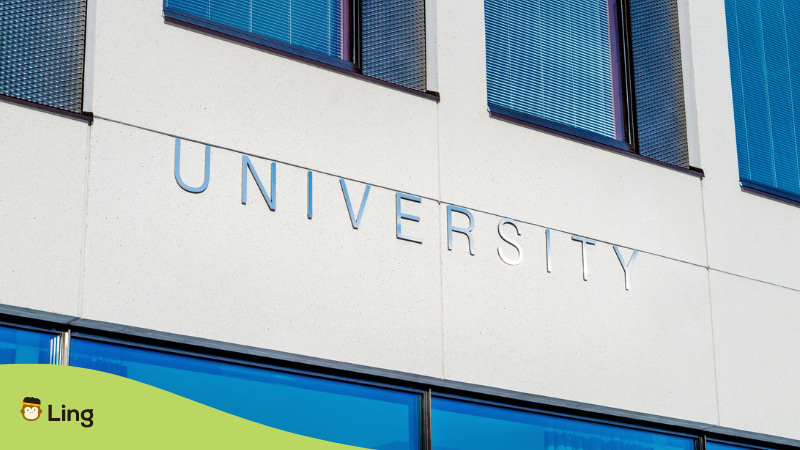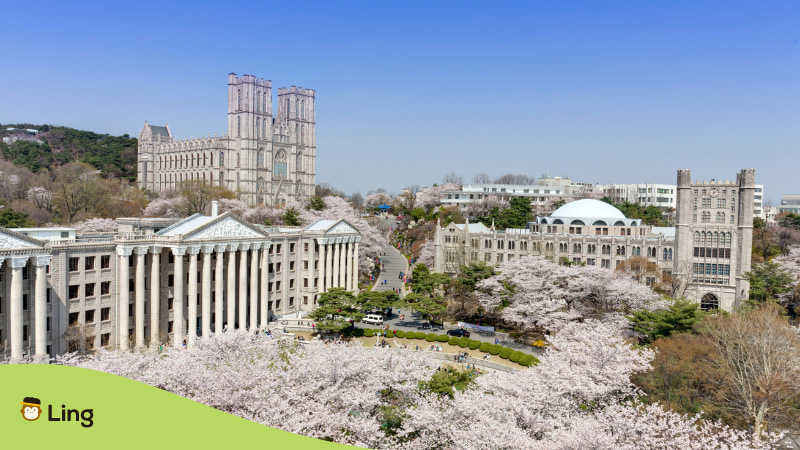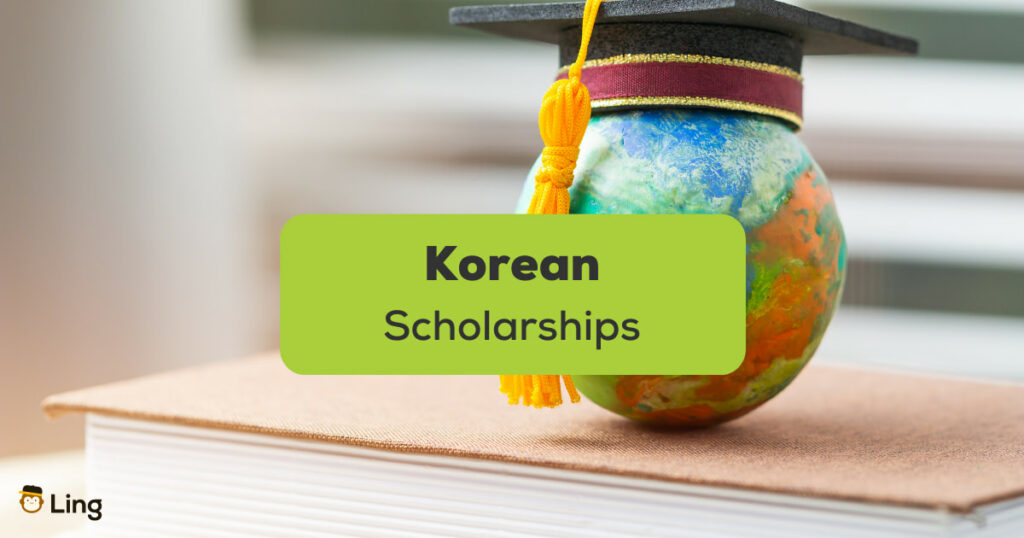Is it your dream to live and study in South Korea (한국 – hanguk)? Then you are probably digging around the internet for answers about how many Korean scholarships there are and the requirements for international students to get one.
Studying abroad is a fulfilling experience that will stay with you forever. Even more, if you achieve your academic goals in the country of your dreams.
Although getting a scholarship in South Korea is certainly not easy, it is not impossible if you put your mind to it. To gain a scholarship In Korea, you need to prepare beforehand with an excellent GPA, have an outstanding portfolio, and, if possible, have certifications and awards. Also, depending on the University and program, you would need a good level of English proficiency.
These tips from a former scholarship recipient can come in handy while preparing for your application. This post will give you useful insights into the possible scholarships you can apply for in South Korea, in-depth information about the KGSP scholarship, and some tips I’ve prepared for your application process and student life.
List Of 11 Korean Scholarships You Can Choose From
There is a plan by the Korean government (Ministry of Education) to triple the number of international students in Korea by 2023. Even the work opportunities for foreign students have increased considerably during the past years.
With this good news, you can rest assured that you will find a scholarship that fits your expectations and professional goals. Here are some options that I’ve curated to provide you with more insight into the kind of scholarships available for undergraduate and graduate degrees.
- Yonsei University Underwood International College (UIC) Admissions Scholarship: 4 years of full tuition.
- Seoul National University (SNU) President Fellowship: Tuition fee covered for six semesters at SNU.
- Korea University Scholarships for International Students: They offer a variety of Scholarships detailed on the official website.
- POSCO Asia Fellowship. Scholarship for Asian students who want to study at a graduate school of a Korean University.
- Ewha Global Partnership Program (EGPP): Full tuition for international women.
- Samsung Global Hope Scholarship Program: Tuition for students with financial need. You need Korean and English proficiency to have your University recommend you.
- KAIST For Graduate And Undergraduate: Fully funded scholarships for foreign undergraduate and graduate students who want to study at KAIST.
- Hanyang TOPIK Scholarship: For international students who obtained a good level of TOPIK after admission to Hanyang.
- Kung Hee University Scholarships: Different fully funded scholarships are detailed on the official website.
- Sogang University Scholarships: Full, half, and quarter scholarship options at Sogang University.
- Global Korea Scholarship (KGSP): Fully funded for bachelor’s degree, master’s, and Ph.D., including living expenses. One of the best choices for students is run by the Korean Government.

About The Global Korea Scholarship (KGSP)
KGSP is a fully-funded scholarship run by the Korean Government, specifically the National Institute For International Education (NIIED).
This Korean scholarship is the most demanded among international students because of its benefits and history of academic excellence in both bachelor’s programs and master’s programs.
It covers the airfare ticket from your home country to the full tuition, medical insurance, and allowance that will allow you to pass your study years with no concerns.
In fact, during the language study year, you will even get free field trips organized by NIIED and your university with the aim of involving you more in Korean culture and lifestyle while also getting relief from the intense study environment.
Application Process
After completing your application documents and submitting them to the Korean embassy in your country, which is the best choice to apply for this scholarship, you will go through an interview screening.
If you are eligible, they will send your application to Korea, where it will go through two more filters: the NIIED offices and each University you applied to. The process is long and difficult, as you are competing with many other applicants from your country. Moreover, each year the criteria become even more strict.
In the application, you can select at least three universities. You will find a bigger chance of being admitted to one of those universities. When you receive an admission response from one of those universities, you can finally celebrate that you have been granted a Korean government scholarship.
One of the best parts of this scholarship is that they offer Korean language courses, where you get to learn about the culture as well. The tricky part is that it is an intense one-year course.
As a scholarship recipient, you are expected to pass at least level 3 (out of 6 levels) in the Test of Proficiency in Korean (TOPIK), which is a very tough three-hour long exam.

Tips For The KGSP Scholarship Application
As a former KGSP student, I’ve seen that the number of people applying for this Korean scholarship has increased drastically. As a result, the application process has become even more challenging. The demand for international students to learn in Korean universities is higher.
The following are some tips that I’ve come up with after experiencing the application process for this specific scholarship.
Note: While reading, please consider that I applied in 2015, and there might have been some changes.
Apply via the Korean embassy of your country. When you apply through the embassy, you have more opportunities to get selected because you can select three different universities.
Don’t miss application deadlines! Many scholarships are open yearly. You wouldn’t want to wait a whole year just because you didn’t have your documents ready in time. You can expect the guidelines and application documents to be uploaded in September for the undergraduate program and in February for the graduate program.
Get support from your School or University. Can your school assist your application processes, such as providing you with advice or a letter of recommendation? If yes, then go for it!
Email the Korean Embassy of your country. They will provide you with everything you need to know regarding living and studying in South Korea. They might even have a community of students to give you advice.
Don’t study for your degree in Korean if you are not proficient. Select a university with classes taught in English, especially if your level of Korean is not TOPIK 5 or 6.
Don’t select only Top universities for your application. No matter how eager you are to enter a SKY university, I suggest selecting only one difficult University. The other options should be Universities with a higher admission rate for international students to increase your chances.
Showcase your academic excellence and interesting personality in your statement. If the evaluators don’t see potential in your statement, you will not pass the first filters. So, take your time with this task, as it has to be outstanding and unique. First, follow the instructions carefully. You will find guideline prompts that you can follow to organize your points, ensuring that all your ideas connect cohesively.
In addition, even if you like to write fancy and complex words, I advise you to avoid them. Be professional, but limit to easy terms for the evaluators to read effortlessly.
Finally, do not forget to capture your personality in the text. It’s necessary to demonstrate your qualities and academic and professional experience. But the evaluators also want to know who you are. It’s your chance to impress them!
After you write it, proofread and edit it as many times as possible. You can also ask your professors to read it for feedback.
If you still think that writing a statement/essay is a difficult task for you or you do not have enough time for this, you can ask for help from a team of professionals, e.g., StudyCrumb. They will be able to write you a great essay faster than the speed of light, and you will forever forget about any difficulties with it.
If you are nervous during the interview at the Korean Embassy, say it! Although I looked very calm on the outside, I got a little nervous when I entered the interview room and saw all the people who would ask me questions. I immediately admitted that I was nervous, which made me feel so much better as the pressure started to fade.
Don’t memorize a list of answers before your interview. Believe me. It will only stress you out. When I applied, there was a girl with a list of answers she was trying to memorize, which became counterproductive as she wasn’t completely focused, but more scared and nervous. You wrote the application; it is your life and your thoughts, and nobody else knows them better than you. So have confidence in yourself, no need for a cheat sheet.
Be charismatic and show your passion for Korea. I am aware that not everyone is immersed in Korean culture. Still, if you can find at least one thing you like about Korea and express it during the interview, it will do wonders.
In my case, it helped me a lot to have said that I was learning the language, that I loved Korean music, movies, and series, and that my dream was to visit Buddhist temples. The interviewers sensed that passion in me, and therefore they knew it would be easy for me to fit into their culture. They do not want students who drop the scholarship halfway! So, convince them that it is not the case with you.
Research as much as possible about the University that you applied to. How are classes taught? Will you become used to their ways? What kind of projects have previous students done at that University? Who are your professors, and what are their best projects? You should know EVERYTHING! Don’t arrive to find surprises.
If you are going to a graduate school, contact your department. No matter how hard it may seem to be in touch with the professors in your department, it is a necessary step. I’m telling you about my experience and my perspective on studying Korean. It may differ if you study in English.
However, I want to note that it was a mistake not have contacted them before arriving. You will need an academic advisor for your thesis project, and not all of them are willing to accept a foreigner.
Don’t expect people to do things for you. Getting a scholarship doesn’t come on a silver platter, as many people that I’ve seen believe. It is your effort and sweat. It is in your hands to make it happen. And I know you can make it happen!

Tips To Study In Korea
After spending almost four years as an international student in Korea, there are tips I would like to share with you if you are interested in Korean student life.
I was a graduate student who studied for my master’s degree in classes taught in Korean. So my condition was challenging compared to other KGSP students who studied the program in English.
Before reading my tips and advice, you should consider that everyone will go through a different situation while studying in South Korea. But, the benefit of learning about others’ experiences is that your perspective can broaden as you get to know the diverse scenarios that students encounter while having a Korean scholarship.
These tips may be helpful to you once you start your life as a student in Korea:
- Learn at least the basic Korean words and phrases before you travel. Not everyone in Korea speaks English unless you are in Itaewon or touristy areas. Even buying medicine at the pharmacy will become a burden if you don’t speak the language, not to mention your communication with your professors or the staff at the immigration office.
- Learn about the culture, the traditions, and the manners. Once you get there, you will have to get used to how people live in that country and be respectful of their culture. So you better get used to it before. There are cultural aspects of being a student, which includes the extremely respectful way you treat your professor. But also, your professor will most likely take you and your classmates out for a casual hangout such as eating, drinking, and experiencing Korean Karaoke, known as ‘noraebang’ (노래방).
- Get to know about the food. If you are not yet familiar with Korean food, I would suggest you find a local Korean restaurant in your area. Be sure the owners are Korean to experience authentic food and get a glimpse of what you will be eating abroad.
- Research where you would like to live unless you are obliged to live on campus. Rents in South Korea are known for being very expensive, with extremely high deposits. To avoid high deposits, most students choose to live in dorms or sub-rent rooms, sharing a house with other people.
- Travel and get to know the country! Don’t spend all your days inside your room studying. Doing it will drain your energy and be counterproductive. Organize your time to visit other cities and tourist locations. Go to concerts, museums, temples, and parks. Do exciting things to relieve the burden of an intense studying environment. Enjoy!
- Have a group of international friends for emotional support. Those going through the same thing will understand you like no one else.
- But don’t get along ONLY with your international friends! In other words, don’t speak only in English. You need to sharpen those Korean language skills.
- So, while in Korea, continue learning the language. Having a higher TOPIK level gives you more points for permanent residency. This a good thing to know if you are looking for a permanent stay in the country. Besides, if you don’t continue practicing, you will eventually forget, and your efforts will go to waste.
- Make Korean friends. Koreans are excellent friends, and they will have your back at your worst times. Plus, you can practice your Korean with them!
Ready To Get A Scholarship And Study In South Korea?
Then Start Learning Korean Today!
Please take my advice and begin learning Korean words and grammar to impress the jury during an interview. Learning the language before your studies will benefit you in obtaining a scholarship. It will also ease your stay in South Korea.
If you’re wondering how to learn the language yourself, we have the answer to your worries. The Ling app is a language learning platform that teaches you the Korean language the easiest way possible, allowing you to learn without needing a teacher or a book. You can learn daily life words and phrases to be ready to speak Korean from day one.
Besides, if you get the KGSP scholarship, starting the language course with enough Korean familiarity will support your hard days of studying for the TOPIK exam.
With only 15 minutes a day, you will enhance your skills to a whole new level. So download the Ling app on the App Store or Play Store and start preparing for your studies today!
Good luck!





